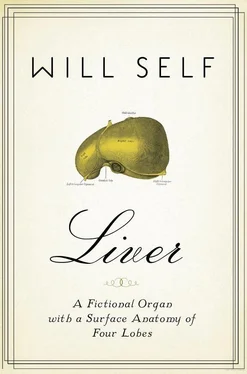Joyce stood planted in the doorway; she hated that she’d intruded, yet found herself unable to retreat. The black silhouette of a bird flapped by the bottom half of the window: out there, in the daylight, were the living; while in this fusty room there were only brain-dead girls, their souls kept alive on faith-support equipment.
Frau Stauben bustled along the corridor. Joyce turned, flustered. ‘Please, I’m sorry. I didn’t mean to intrude — the candles — ’
But her prospective landlady was unfussed. ‘It is a silly thing,’ she said. ‘My daughter,’ she continued, pointing at the girl in the ski suit, ‘she dies many of these years ago, it was a cancer in the blood.’
‘Leukaemia?’
‘Yes. so. I am always meaning to do the tidy’ — she made sweeping motions with her sturdy hands — ‘but. ’ Frau Stauben left this, and the hands, dangling. Joyce looked into her periwinkle-blue eyes and saw nothing unusual, only the cliché of humanity. All at once she decided she would try to like Frau Stauben — Vreni ; trust her, maybe.
‘So,’ the other woman resumed, taking Joyce by the arm and leading her not towards the living room but further into the bowels of the apartment, ‘Herr Weiss, Ueli, he had to be gone — you were a long time.’
‘Really?’ Joyce felt not abandoned but relieved.
‘Yes, that Marianne — ’ Frau Stauben pulled herself up. ‘So, this is the room I am hiring.’
It was large, clean and, in contrast to the others, well aired. Twin beds were pushed together beside one wall, the fitted carpet was an institutional tan, the wallpaper a pattern of trellises and climbing roses.
‘It is’ — she made reckoning on her stubby fingers — ‘two hundred and ten francs for the weeks, and I can be giving you le petit déjeuner — an evening meal also, if you’re wanting?’
Treu und Glauben . ‘That’s fine, Frau Stauben,’ Joyce said. ‘I’ll take it.’
Frau Stauben’s grey hair lay in a mass of spirals on her rounded shoulders, the links of her spectacles chain were buried in the fuzz of her cardigan; the spectacles themselves rose and fell on her massive breast. She was still holding Joyce’s arm. ‘Please, you will call me Vreni — and. ’
Joyce touched her own breast. ‘Joyce.’
‘Joyce. Exactly. Are you very sick-feeling, Joyce?’ Frau Stauben’s eyes were too blue — doll’s eyes with bags under them.
‘No, not very sick at all. ’ She hesitated, wondering whether to speak of her odd feelings since the abortive visit to Gertrudstrasse, but decided against it. ‘I came to Zürich early, to — well, presumably Herr Weiss explained? My cancer is not very advanced, I don’t think I’ll be any kind of problem to you — ’
‘No, no, you are not understanding, Joyce!’ Vreni Stauben became animated. ‘I am not having any problems with this — I have seen the very sicks, the very sicks. I only wonder. ’ She twiddled an invisible dial, tuning in to her wonderment. ‘But really, I am too rude!’
Vreni Stauben hurried about, breathing with the rumbling squeak of the obese. She fetched towels and sheets for Joyce, then made up the bed. She showed Joyce the kitchen cupboards with their plastic boxes of muesli, and the fridge with its quarter-litre tubs of yoghurt.
‘If you are up first of time,’ Vreni said, grinning conspiratorially, ‘I will be frying the R  schti and the eggs.’ Then she gave Joyce a set of keys and demonstrated the tricky manoeuvre required to turn the mortise lock. All the while, the smoky-blue cat with the shaved belly padded along behind them. ‘She is the stupid animal,’ Vreni contended indulgently — and Joyce, who didn’t like cats, silently concurred.
schti and the eggs.’ Then she gave Joyce a set of keys and demonstrated the tricky manoeuvre required to turn the mortise lock. All the while, the smoky-blue cat with the shaved belly padded along behind them. ‘She is the stupid animal,’ Vreni contended indulgently — and Joyce, who didn’t like cats, silently concurred.
When Joyce was alone in her new room, she sat down on the side of one of the beds, unzipped her ankle boots and eased them off. You’ve been on us a lot today , her sore feet complained. We’re not used to it .
Well . Joyce bent forward to grasp first one ball, then the second. I know that, but you may have to . She lay back on the pillows, intending to rest for a moment, but unconsciousness mugged her with its soft cosh.
She dreamt of Isobel, a Tommy-girl in a khaki wool uniform, puttees wound round her milk-bottle calves, a salad bowl tin helmet on her crunchy dyed hair. Joyce’s daughter was hunched up in a shell crater; illuminated by the bursting of whizz-bangs , one of her cheeks was shinily artificial. Gutta-percha . Ueli Weiss — in a full-length leather coat, Iron Cross at his high collar — stood smoking on the far side of a black pool, from the middle of which poked a skeleton’s hand holding a pistol. Despite the shellfire it was eerily silent, except for Chopin’s B Flat Sonata, played very softly by a virtuoso who was out of sight in no man’s land . The melody insinuated itself within the after-tone of each note.
The Angel of Mons slithered down out of the hot orange sky. It was wearing Marianne Kreutzer’s tight face mask, and its billowing white silk robe looked deliciously cool . Even though the Angel was fifteen feet high, once it had grasped Isobel under her arms, it was unable to lift her.
‘I’ll miss the flight, Mum,’ Isobel said. ‘Don’t leave me here.’ She pawed at her mother’s blouse, her stupid manicured nails catching in the fabric.
Joyce cried, ‘Get off me!’ And woke to the terrifying banality of Vreni Stauben’s cat, which was trampling her upper body. It was dark. After she had switched the light on and been to the toilet, she checked her watch: 3.44 a.m. She undressed, put the cat out the door and returned to the twin bed. She fell asleep immediately, and in the morning was hungry enough for both the R  schti and two fried eggs.
schti and two fried eggs.
Every day, after breakfast, Joyce left the Universitätstrasse apartment and walked the Zürich streets. Vreni Stauben tried to persuade her to take cabs — or at least the tram or bus. But Joyce told her she preferred to walk.
In the mornings, when she set out on her expeditions, there were still misty rags hanging from the trees on the wooded slopes surrounding the city; then, as the morning wore on, the rags were torn away. There was a succession of high, bright, chilly days. With each venture she made, Joyce unwound the thread of orientation, down between the dully neoclassical museum and library buildings, then across the Limmat Bridge, before trailing it round the edge of the old town.
Vreni told Joyce about Weinberg’s, and the cheaper department store, Globus, both of which were on Bahnhofstrasse. She took her time shopping, far more than she would have done at the Bull Ring in Birmingham. The shop assistants were no more presentable than those at home, but, to be frank — and since she was addressing herself alone, why shouldn’t she be — they were far more attentive, and polite, and spoke markedly better English as well.
Joyce realized she was building a wardrobe , and it was from this alone she deduced that her sojourn in Zürich would be for quite a while : the hours sheathed in good-quality cotton underwear, the days helped into a comfortable, yet stylish, navy two-piece — this in a lightweight wool, since Vreni had told her to expect warmer weather in April.
At Apartment 7, Universitätstrasse 29, Joyce adapted herself to the rhythms of her landlady’s life. It was much as she had always feared: the petty sumptuary rules, the cat-and-weather conversations, the talk of milk supply — and ailments. A pooling of sensibility with no sex barrier to prevent it: is that my support hose, or hers?
Читать дальше

 schti and the eggs.’ Then she gave Joyce a set of keys and demonstrated the tricky manoeuvre required to turn the mortise lock. All the while, the smoky-blue cat with the shaved belly padded along behind them. ‘She is the stupid animal,’ Vreni contended indulgently — and Joyce, who didn’t like cats, silently concurred.
schti and the eggs.’ Then she gave Joyce a set of keys and demonstrated the tricky manoeuvre required to turn the mortise lock. All the while, the smoky-blue cat with the shaved belly padded along behind them. ‘She is the stupid animal,’ Vreni contended indulgently — and Joyce, who didn’t like cats, silently concurred.










